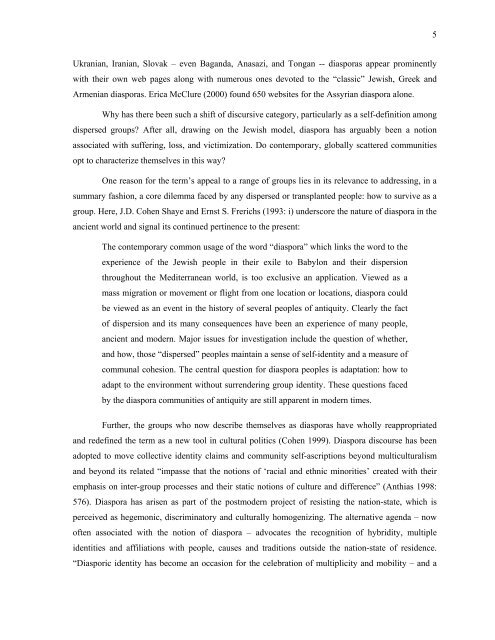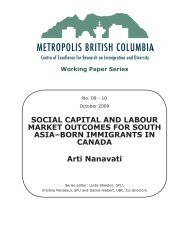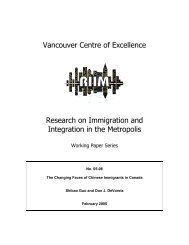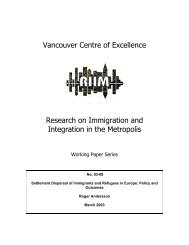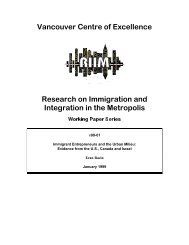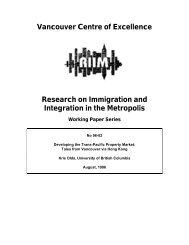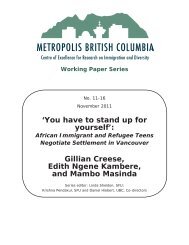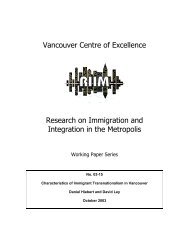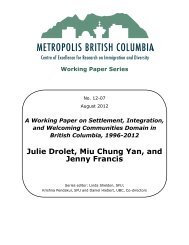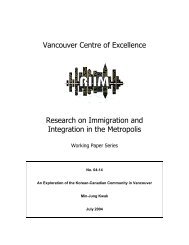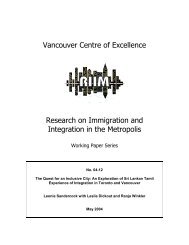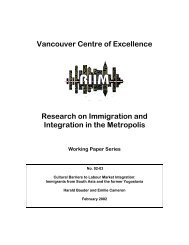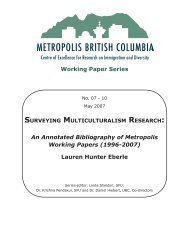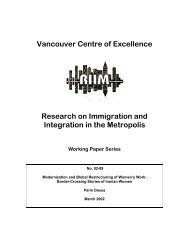Religion in Migration, Diasporas and Transnationalism - Metropolis BC
Religion in Migration, Diasporas and Transnationalism - Metropolis BC
Religion in Migration, Diasporas and Transnationalism - Metropolis BC
You also want an ePaper? Increase the reach of your titles
YUMPU automatically turns print PDFs into web optimized ePapers that Google loves.
5<br />
Ukranian, Iranian, Slovak – even Bag<strong>and</strong>a, Anasazi, <strong>and</strong> Tongan -- diasporas appear prom<strong>in</strong>ently<br />
with their own web pages along with numerous ones devoted to the “classic” Jewish, Greek <strong>and</strong><br />
Armenian diasporas. Erica McClure (2000) found 650 websites for the Assyrian diaspora alone.<br />
Why has there been such a shift of discursive category, particularly as a self-def<strong>in</strong>ition among<br />
dispersed groups After all, draw<strong>in</strong>g on the Jewish model, diaspora has arguably been a notion<br />
associated with suffer<strong>in</strong>g, loss, <strong>and</strong> victimization. Do contemporary, globally scattered communities<br />
opt to characterize themselves <strong>in</strong> this way<br />
One reason for the term’s appeal to a range of groups lies <strong>in</strong> its relevance to address<strong>in</strong>g, <strong>in</strong> a<br />
summary fashion, a core dilemma faced by any dispersed or transplanted people: how to survive as a<br />
group. Here, J.D. Cohen Shaye <strong>and</strong> Ernst S. Frerichs (1993: i) underscore the nature of diaspora <strong>in</strong> the<br />
ancient world <strong>and</strong> signal its cont<strong>in</strong>ued pert<strong>in</strong>ence to the present:<br />
The contemporary common usage of the word “diaspora” which l<strong>in</strong>ks the word to the<br />
experience of the Jewish people <strong>in</strong> their exile to Babylon <strong>and</strong> their dispersion<br />
throughout the Mediterranean world, is too exclusive an application. Viewed as a<br />
mass migration or movement or flight from one location or locations, diaspora could<br />
be viewed as an event <strong>in</strong> the history of several peoples of antiquity. Clearly the fact<br />
of dispersion <strong>and</strong> its many consequences have been an experience of many people,<br />
ancient <strong>and</strong> modern. Major issues for <strong>in</strong>vestigation <strong>in</strong>clude the question of whether,<br />
<strong>and</strong> how, those “dispersed” peoples ma<strong>in</strong>ta<strong>in</strong> a sense of self-identity <strong>and</strong> a measure of<br />
communal cohesion. The central question for diaspora peoples is adaptation: how to<br />
adapt to the environment without surrender<strong>in</strong>g group identity. These questions faced<br />
by the diaspora communities of antiquity are still apparent <strong>in</strong> modern times.<br />
Further, the groups who now describe themselves as diasporas have wholly reappropriated<br />
<strong>and</strong> redef<strong>in</strong>ed the term as a new tool <strong>in</strong> cultural politics (Cohen 1999). Diaspora discourse has been<br />
adopted to move collective identity claims <strong>and</strong> community self-ascriptions beyond multiculturalism<br />
<strong>and</strong> beyond its related “impasse that the notions of ‘racial <strong>and</strong> ethnic m<strong>in</strong>orities’ created with their<br />
emphasis on <strong>in</strong>ter-group processes <strong>and</strong> their static notions of culture <strong>and</strong> difference” (Anthias 1998:<br />
576). Diaspora has arisen as part of the postmodern project of resist<strong>in</strong>g the nation-state, which is<br />
perceived as hegemonic, discrim<strong>in</strong>atory <strong>and</strong> culturally homogeniz<strong>in</strong>g. The alternative agenda – now<br />
often associated with the notion of diaspora – advocates the recognition of hybridity, multiple<br />
identities <strong>and</strong> affiliations with people, causes <strong>and</strong> traditions outside the nation-state of residence.<br />
“Diasporic identity has become an occasion for the celebration of multiplicity <strong>and</strong> mobility – <strong>and</strong> a


